- Laura Chilson-Parks, History of Art and Architecture
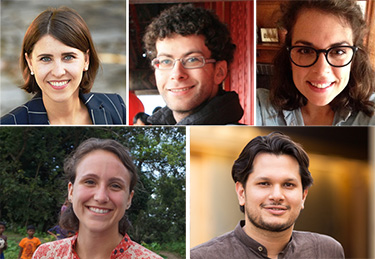
- Lubabah Chowdhury, English
- Danielle Falzon, Sociology
- Julia Hurley, Archaeology and the Ancient World
- Rehan Jamil, Political Science
- Mayer Juni, History
- Tommaso Pepe, Italian Studies
- Ieva Zumbyte, Sociology
Fellowship awardees will travel to Bangladesh, France, Pakistan, India, Mexico, Israel and England to significantly advance their research. They study a wide range of subjects, from social policy and citizenship to childcare provisions and anti-fascist resistance in Italy.
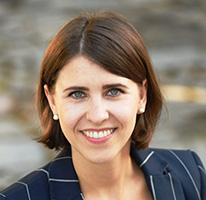 Ieva Zumbyte investigates the socio-economic and political factors that impact state-led childcare provisions in urban Chennai, India. Zumbyte says that Chennai is an ideal site to study how a state can provide quality childcare in a place where effective service delivery seems to be the most challenging. It is one of the fastest urbanizing cities in the world, characterized by high degree of informality, resource scarcity, and social exclusion.
Ieva Zumbyte investigates the socio-economic and political factors that impact state-led childcare provisions in urban Chennai, India. Zumbyte says that Chennai is an ideal site to study how a state can provide quality childcare in a place where effective service delivery seems to be the most challenging. It is one of the fastest urbanizing cities in the world, characterized by high degree of informality, resource scarcity, and social exclusion.
“The Global Mobility Fellowship will allow me to conduct fieldwork which requires a deep immersion in the local urban life: a survey, observations, interviews and focus groups discussions, with both individuals who represent the demand (mothers and their families) and supply side of childcare (childcare workers and local functionaries),” says Zumbyte.
With preliminary fieldwork completed in Chennai this summer, she has established various connections with stakeholders and is excited to return for research in the next academic year.
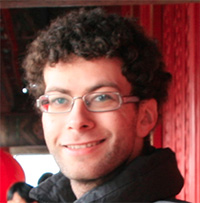 Tommaso Pepe will be traveling to Israel to research and reconstruct an overlooked chapter in the history of Italian anti-Semitic persecution represented by the group of Italian Jews who fled to Israel in the attempt to escape Nazi and Fascist persecutions from 1938-1967. His research project includes phases of archival investigation at the Yad Vashem - The World Holocaust Remembrance Center and the Central Archives for the History of the Jewish People, as well as research through the department of Romance Studies at Hebrew University.
Tommaso Pepe will be traveling to Israel to research and reconstruct an overlooked chapter in the history of Italian anti-Semitic persecution represented by the group of Italian Jews who fled to Israel in the attempt to escape Nazi and Fascist persecutions from 1938-1967. His research project includes phases of archival investigation at the Yad Vashem - The World Holocaust Remembrance Center and the Central Archives for the History of the Jewish People, as well as research through the department of Romance Studies at Hebrew University.
He is looking forward to “the opportunity to live and experience a new country, characterized by an intense and complex history, as well as the opportunity to work and carry out research in a non-English speaking context,” says Pepe.
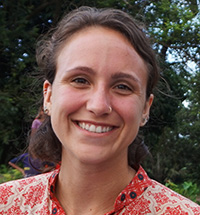 Danielle Falzon is conducting research on climate change adaptation planning in Bangladesh. “As one of the countries that is most vulnerable to climate change, Bangladesh is a key site where adaptation interventions are being implemented, by a confluence of donor agencies, international and local NGOs, and government initiatives,” says Falzon.
Danielle Falzon is conducting research on climate change adaptation planning in Bangladesh. “As one of the countries that is most vulnerable to climate change, Bangladesh is a key site where adaptation interventions are being implemented, by a confluence of donor agencies, international and local NGOs, and government initiatives,” says Falzon.
She will spend a semester traveling around Bangladesh, seeing firsthand what the adaptation projects look like on the ground and talking to community members about their understandings of climate vulnerability and resilience.
“I am most looking forward to leaving Dhaka, the capital city, to see the implementation of climate adaptation projects in practice. While I have been fortunate to spend summers talking to those who are planning and funding adaptation projects, being able to go see the projects I've been hearing about will add a crucial element to my research,” says Falzon.
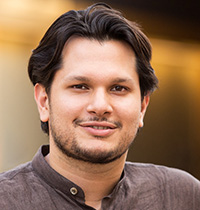 Rehan Rafay Jamil will be traveling to Pakistan to study the politics of social policy expansion in the country. His dissertation examines the political origins and citizenship impacts of Pakistan’s largest social safety net, the Benazir Income Support Programme (BISP), an unconditional cash transfer program targeted at women.
Rehan Rafay Jamil will be traveling to Pakistan to study the politics of social policy expansion in the country. His dissertation examines the political origins and citizenship impacts of Pakistan’s largest social safety net, the Benazir Income Support Programme (BISP), an unconditional cash transfer program targeted at women.
He will administer an original household survey along with open-ended interviews and focus groups with BISP beneficiaries during his fellowship. His dissertation aims to help understand how social policy programs can improve women’s political participation and citizen-state engagement in emergent democracies in the Global South.
“The Global Mobility fellowship will enable me to continue field work, and combine a variety of different research methods to understand how social policy interventions such as cash transfer programs impact state-citizen engagement and the politics that shape their provision” says Jamil.
These competitive fellowships provide doctoral students with the stipend support and the flexibility to pursue dissertation or pre-dissertation research out of residence. The fellowship takes the place of a standard teaching assistantship, research assistantship or proctorship. Applications for summer of 2020 will open this fall.